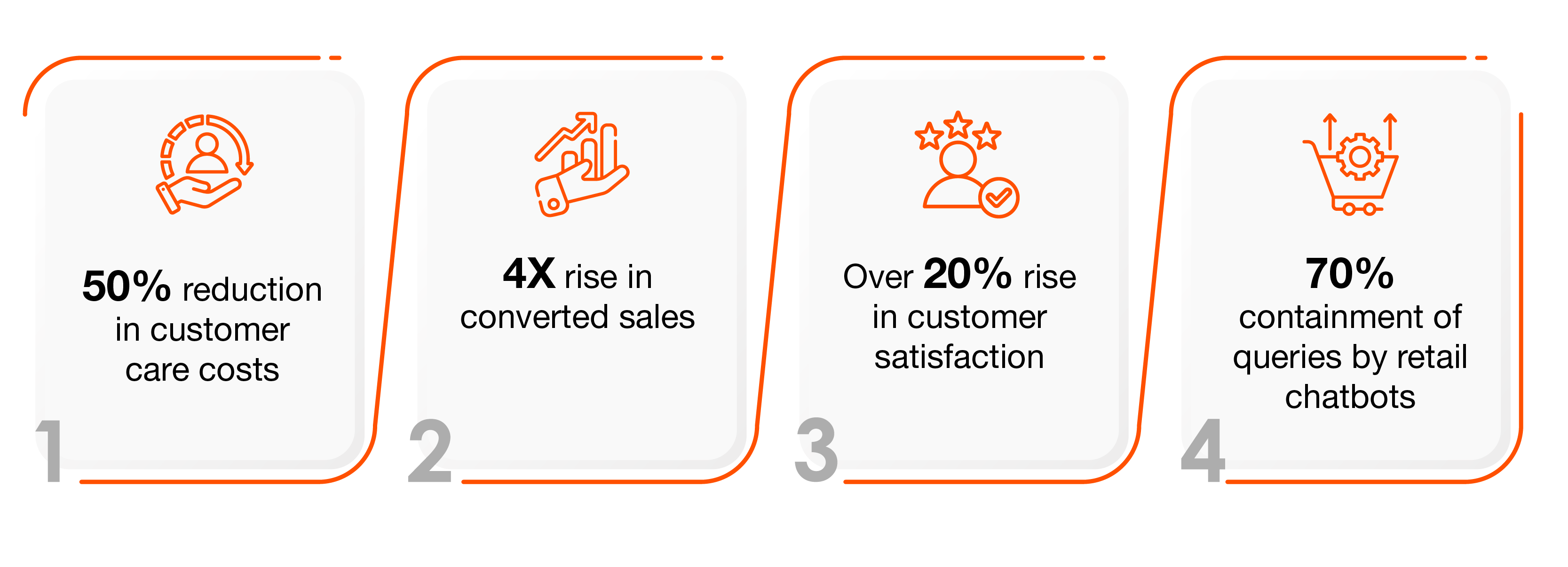How Intelligent Automation is Solving Retail’s Biggest Challenges?
Posted on : October 04th 2024
Author : Sanjeev Jain
Intelligent automation is transforming the retail industry. Current technology can automate nearly 50% of retail tasks. Retailers are adopting these technologies to improve productivity, cut costs, and enhance the customer experience in response to rising operational expenses and increasing consumer expectations. Intelligent automation can resolve critical supply chain challenges such as inefficient inventory management, slow supply chains, and poor customer experiences. By automating these tasks, retailers can streamline operations, reduce waste, and deliver customers a more personalized and seamless shopping experience.
Major retailers utilize automated fulfillment systems to streamline inventory management across multiple locations, boosting efficiency and customer satisfaction. Intelligent automation can improve order fulfillment accuracy, streamline picking and packaging procedures, and improve inventory storage to change warehouse management completely. Intelligent automation can save retailers’ supply chain and logistics transportation costs by improving demand forecasting, route optimization, and route optimization.
Besides, smart automation uses machine learning and advanced analytics to accurately forecast demand by analyzing customer behavior, identifying trends, and predicting demand. This helps businesses reduce overstocking and stockouts, enhance inventory control, and boost sales. By utilizing robotic process automation, artificial intelligence, and machine learning, retailers can provide better consumer experiences, make data-driven decisions, and obtain real-time operational visibility.
As the retail industry grows, intelligent automation will continue to shape its future, helping retailers stay competitive while delivering superior customer experiences.
Enhancing Retail Services With Customer-Centric Automation

Conversational AI, including chatbots and virtual assistants, is transforming customer service in retail by handling repetitive inquiries. This allows human agents to focus on complex issues, leading to a 50% reduction in customer care costs and a 20% increase in satisfaction.
Powered by NLP, sentiment analysis enables retailers to monitor customer feedback, identify challenges, and improve overall experiences. This data-driven approach helps refine products and marketing strategies, boosting customer satisfaction and loyalty through a deeper understanding of consumer needs.
Predictive Inventory Restocking with ML and Stock Alerts
ML-Driven Inventory Optimization
Machine learning has significantly transformed inventory management, enabling retailers to adjust stock levels more effectively. Predictive algorithms analyze historical and real-time data to accurately forecast demand, optimizing inventory allocation across locations and seasons. By considering factors such as sales trends and customer behavior, ML algorithms assist retailers in making informed decisions, mitigating risks associated with over and under-stocking.
Automated Stock Alerts and Supplier Communication
Automated stock alerts and supplier communication systems enhance inventory management by enabling real-time monitoring and replenishment. These systems track inventory levels and notify retailers when stock reaches critical levels, preventing out-of-stock situations. By integrating automated alerts with supplier communication, retailers can improve inventory turnover and minimize waste, ensuring products are available when customers need them.
Streamlining Financial Processes with OCR-Powered Invoice Processing
Optical Character Recognition (OCR) technology revolutionizes invoice processing by automating data extraction, including vendor details, invoice numbers, and amounts. This automation reduces the need for manual intervention, increasing accuracy and accelerating workflows. Retailers using OCR have experienced improved precision, faster turnaround times, and enhanced cash flow management while reducing the risk of human error.
Automated Matching and Payment Settlement
Apart from OCR, automated matching and payment settlement processes further streamline financial operations. These systems cross-reference purchase orders with invoices to verify payment accuracy. By automating this verification process, retailers can speed up payment processing, reduce administrative workloads, and capitalize on early payment discounts. This increased efficiency improves overall financial performance and helps avoid discrepancies.
Ethical Considerations in Retail Automation
As retail automation continues to grow, it is crucial for retailers to balance efficiency gains with a commitment to privacy and transparency. Customers increasingly expect retailers to be open about how their data is collected and used, with studies showing that 90% of shoppers believe retailers should disclose their data usage practices. Therefore, it is vital for retailers to prioritize consumer consent and implement robust data protection measures to maintain trust and foster long-term customer relationships.
Moreover, ethical considerations extend to how employees are treated in an automated retail environment. Retailers must ensure employees are provided opportunities for reskilling and adaptation to new roles as automation technologies are implemented. The displacement of jobs because of automation raises important social responsibility concerns. Retailers should foster a culture of fairness and transparency, creating a more equitable environment that benefits employees and customers.
The Straive Advantage
At Straive, we empower retailers to leverage intelligent automation through our data-driven solutions, which are designed to optimize operations and enhance customer engagement. We help streamline inventory management, customer service, and financial workflows by integrating AI, machine learning, and advanced analytics.
With our tailored approach, retailers can:
- Achieve greater operational efficiency
- Reduce costs through automation
- Personalize customer interactions with advanced AI tools
- Make data-backed decisions to improve product availability and sales
Straive’s expertise ensures a seamless transition to automation, enabling retailers to stay ahead of the competition while maintaining transparency and ethical practices.
We want to hear from you
Leave a Message
Our solutioning team is eager to know about your
challenge and how we can help.